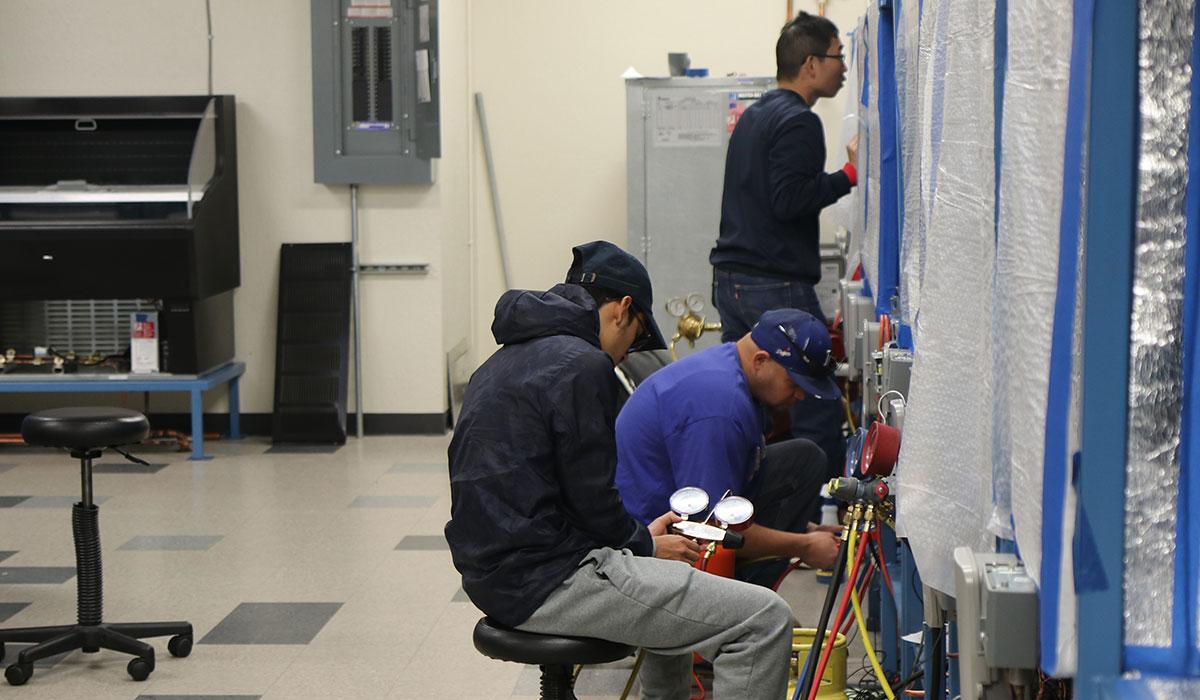
It’s hard to believe that we’re almost to the end of the 2019 Fall semester. Even though final projects and exams are typically a source of stress for college students (which is completely understandable), we wanted to celebrate the good work of TMCC students in their various disciplines by visiting classes which are conducting final projects.
HVAC/R: Staying Cool Under Pressure
Students in TMCC’s Accelerated HVAC/R started their final project at 8:30 a.m. on the first cold day of the year. Their task? To build a medium application refrigeration unit from scratch, and then to calibrate and test it using a series of prescribed data points and measurements.
The Accelerated HVAC/R program, which launched in 2018, marches students swiftly through the nuts and bolts (and all the other ins and outs) of how to work as an HVAC/R technician over the course of an academic year. Students working on the current final project started the program in August and took a 15-credit load this first semester. They will face another 15-credit semester in the spring to complete the program.
“Our final project is piping and wiring for a non-critical system,” said TMCC student Brandon Talbort. “And then, once we’ve built it, we check it to make sure it has no leaks.” Talbort, like the rest of his cohort, began the accelerated program this semester and is projected to complete the program in May. Students who complete the accelerated HVAC/R program emerge with two skill certificates and knowledge that local industry leaders say is key to landing a full-time career. “There’s a lot of information in this class, and to be honest, when we first started I was like ‘man this is a lot of information...’ it was kind of blowing my mind, but Mr. Evans always takes us through the steps, so he makes it easy to understand.”
Talbort began working on his final project two weeks before. “I wanted to get it right and I wanted it to look clean because that’s really important,” he said. Talbort and other members of his cohort busily check the systems they have built and designed, looking for leaks before they begin the testing process where they under and over-charge the system, so they know what each condition looks like. The students use an app on their phones called “ChillMaster” to calibrate their pressure and temperature of their refrigeration units.
“The best part about this class is everything is hands on,” said Talbort. “There is some book-work at the beginning... so you can learn the lingo to call things what they are and not the ‘do-hicky’ over there or the ‘spinny thingy’, you know? Mr. Evans makes it really easy to learn, and that’s great.”
“If they start to ask too many questions, I leave because they need to start building their confidence to do this on their own,” said Wes Evans, who has taught HVAC/R classes at TMCC for 24 years. “It’s not like you’re given a written exam [in these classes. Instead,] you’re given a data sheet and students have to make sure it matches what’s required out there to be an operating, functional system. Students also have to make sure that the tools we’ve introduced in this particular class are being used correctly from the gauges to the meters to the recovery units to vacuum pumps to micron gauges. When it comes down to the end, students need to be proficient in everything I’ve just listed—and that's their final.”
Students in the accelerated program will work on various types of equipment, including ice machines, refrigeration systems, residential heating, light commercial heating and air conditioning. Much of this work is completed in classroom spaces that houses the latest technology.
Evans said that graduates of the HVAC/R program typically find jobs before they complete the program. For Talbort, that’s the goal. “After I get some field experience, I want to try and do this by myself,” he said. “I want to be able to work for myself. I think owning my own business will afford me and my family a great opportunity.”
For more information about the HVAC/R programs at TMCC, contact the Applied Technologies Division at 775-856-5300.






